The Expedia business model makes money by charging a commission on travel bookings made through its platform. The online travel company offers a wide range of travel products and services, including flights, hotels, car rentals, vacation packages, and activities.
The company’s success can be attributed to its innovative approach to the travel industry. Expedia has been at the forefront of the shift to online travel bookings, and it has continued to evolve its business model to keep up with changing consumer preferences. For example, during the COVID-19 pandemic, Expedia shifted its strategy to focus more on working with consumers on their trips, rather than just focusing on the volume of travel bookings.
The company also generates revenue from advertising and media, insurance, and other travel-related services. Expedia has a range of brands under its umbrella, including Hotels.com, Vrbo, Orbitz, Travelocity, and Trivago, which allows it to appeal to a wide range of travelers and capture a significant share of the travel market.
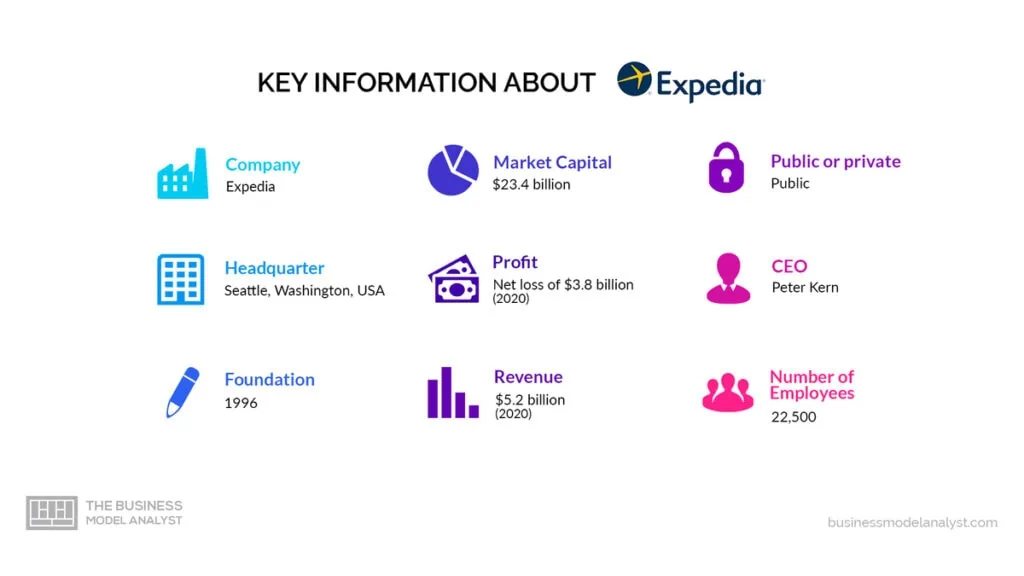
Contents
A brief history of Expedia
Expedia was founded in 1996 as a division of Microsoft, operating as an online travel agency (OTA). It was one of the first OTAs and played a significant role in revolutionizing and democratizing travel by empowering customers to manage their travel plans. In 2001, Microsoft sold its interest in Expedia, and it became an independent company.
Over the years, Expedia has expanded its offerings and acquired several travel fare aggregators and metasearch engines, including Hotels.com, Vrbo, Travelocity, Hotwire.com, Orbitz, Ebookers, CheapTickets, CarRentals.com, Expedia Cruises, Wotif, and Trivago. These acquisitions have helped Expedia become one of the largest travel companies in the world.
Expedia’s business model is based on providing customers with a platform to search for and book travel services, including flights, hotels, car rentals, and vacation packages. The company generates revenue by charging commissions on bookings made through its platform and by selling advertising space to travel suppliers.
Expedia has also invested heavily in technology, developing innovative tools and features to improve the customer experience. For example, the company’s virtual agent, which uses artificial intelligence to help customers find and book travel services, has been well-received by users.
Who Owns Expedia
Expedia Group, Inc., is a publicly-traded company that, as mentioned, owns and operates quite a few travel fare aggregators and metasearch engines, including Expedia.com, Hotels.com, Vrbo, Travelocity, Hotwire.com, Orbitz, Ebookers, CheapTickets, CarRentals.com, Expedia Cruises, Wotif, and Trivago.
The largest shareholder of Expedia Group is Barry Diller, who owns approximately 15% of the company’s outstanding shares. Diller is a media executive and the founder of IAC, a conglomerate that owns several internet companies, including Match Group, Vimeo, and Dotdash. Diller has been involved with Expedia since its inception in the late 1990s, when it was a division of his company, USA Networks.
Other notable shareholders of Expedia Group include Vanguard Group, BlackRock, and State Street Corporation, which are all institutional investment firms. These firms hold significant stakes in many publicly traded companies and are responsible for managing the investments of their clients, which include pension funds, endowments, and other large organizations.
Expedia Group’s management team is led by CEO Peter Kern, who has been with the company since 2017 and was appointed CEO in 2020. Kern has a background in private equity and has held executive positions at several media and entertainment companies, including Tribune Media and InterMedia Partners.
To sum up, the Expedia Group is owned by a diverse group of shareholders, including institutional investors, individual investors, and its management team. The company’s ownership structure is typical of a publicly traded company and reflects the interests of its various stakeholders.
Expedia Mission Statement
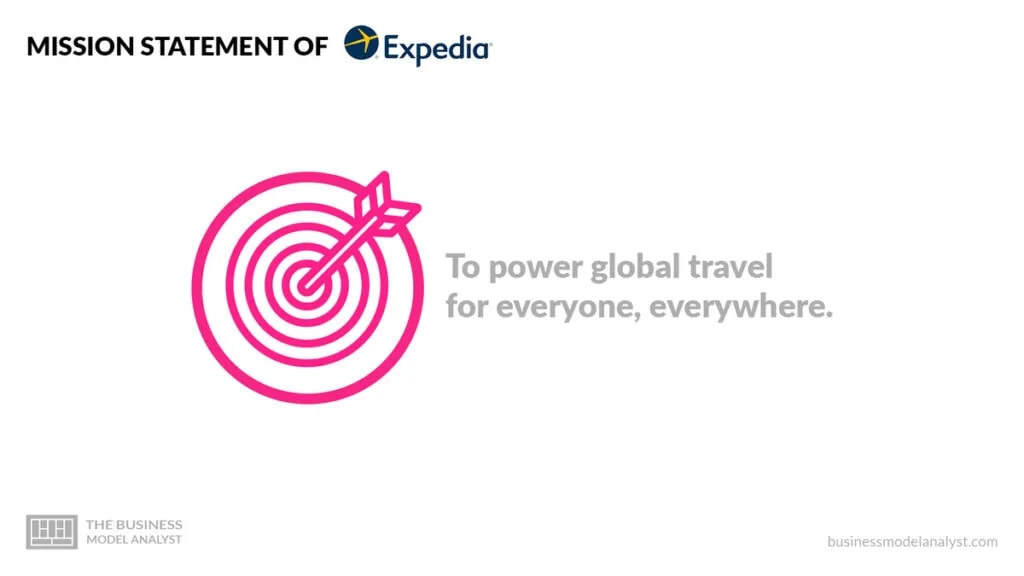
Expedia’s mission statement is “to power global travel for everyone, everywhere.”
This statement reflects the company’s commitment to providing travelers with easy access to the best selection of travel products and services, as well as to offering innovative technology solutions that make the travel experience more enjoyable and convenient.
Expedia’s mission statement also emphasizes the company’s goal of making travel accessible to people from all over the world, regardless of their location or background.
How Expedia Works
Expedia is an online travel agency that offers a platform for travelers to search and book flights, hotels, rental cars, cruises, and other travel services. The company operates on an agency model where it facilitates travel bookings and acts as the agent in the transaction, passing reservations booked by the traveler to the relevant travel provider.
Expedia makes money through commissions or ticketing fees from the travel supplier and traveler. Expedia’s business model revolves around offering travel platforms where travelers can search for flights and other travel reservations. By aggregating travel options in one place, the company encourages a critical mass of travelers to use their site to quickly and conveniently book travel.
Expedia also offers loyalty programs, such as Expedia Rewards, to incentivize customers to book through their platform and earn rewards points that can be redeemed for future travel bookings. Expedia operates an extensive portfolio of brands to respond to different traveler needs and preferences. Some of the well-known brands include Expedia.com, Hotels.com, Hotwire, Orbitz, and Travelocity.
Through its subsidiary, Expedia Partner Solutions, the company provides technology, tools, and services to other travel companies to help them grow their businesses. To generate revenue, Expedia makes available a variety of services provided by lodging properties, airlines, car rental companies, and cruise lines. The company also offers travel insurance and business travel services.
In addition, Expedia invests in marketing to attract more customers to its platform and increase travel spending. Overall, Expedia’s technology and partnerships with travel providers allow it to offer a wide range of travel options to customers while generating revenue through commissions and fees.
How Expedia Makes Money
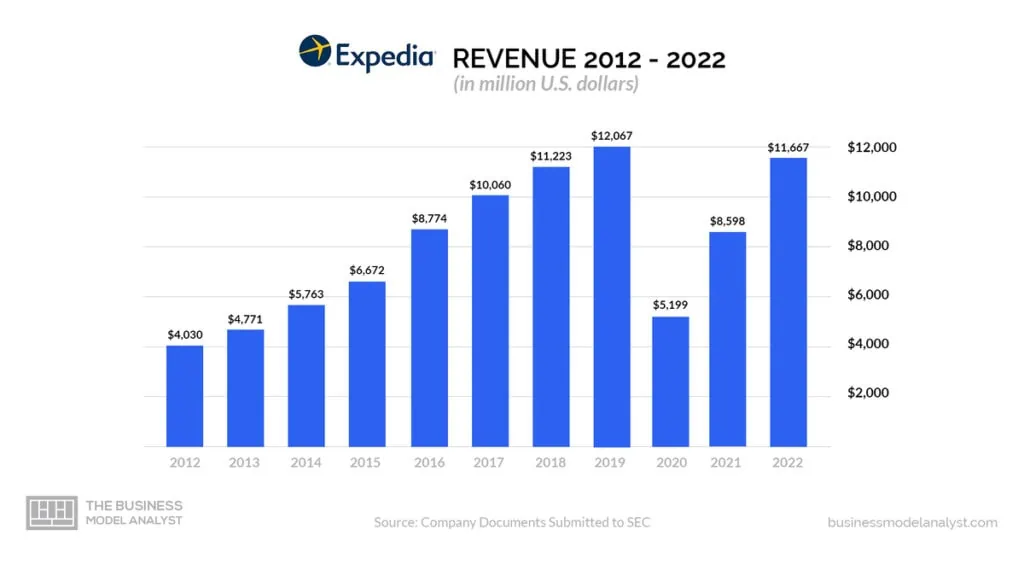
Expedia is a travel booking website that generates revenue through multiple income streams. The company primarily makes money by selling travel products and services on a stand-alone and package basis through the following business models: merchant, agency, and advertising.
Merchant Model (Reselling of travel packages and commission fees)
Expedia purchases travel packages as a merchant and, then, resells them to customers at a slightly higher price. This model allows Expedia to make a profit off of the increased margin. The company also occasionally makes commission fees from hotels, increasing its exposure through the Expedia website.
Agency Model (Commissions on bookings)
The agency model involves Expedia acting as an intermediary between customers and travel suppliers. Expedia earns a commission for each booking made through its website. This model allows Expedia to offer a wide range of travel options to customers without having to purchase and resell travel packages directly.
Advertising Model (Advertising)
Expedia generates revenue by providing advertising space to travel suppliers and other businesses. Suppliers can pay to have their products and services displayed prominently on the Expedia website. This model allows Expedia to generate revenue without having to purchase or sell travel products directly.
In addition to these three main income streams, Expedia also generates revenue through B2B travel programs and booking fees. The company had gross travel bookings of $72.4 billion flow through its site in 2021, making it one of the largest travel booking websites in the world.
Expedia Business Model Canvas
The Expedia Business Model can be explained in the following business model canvas:
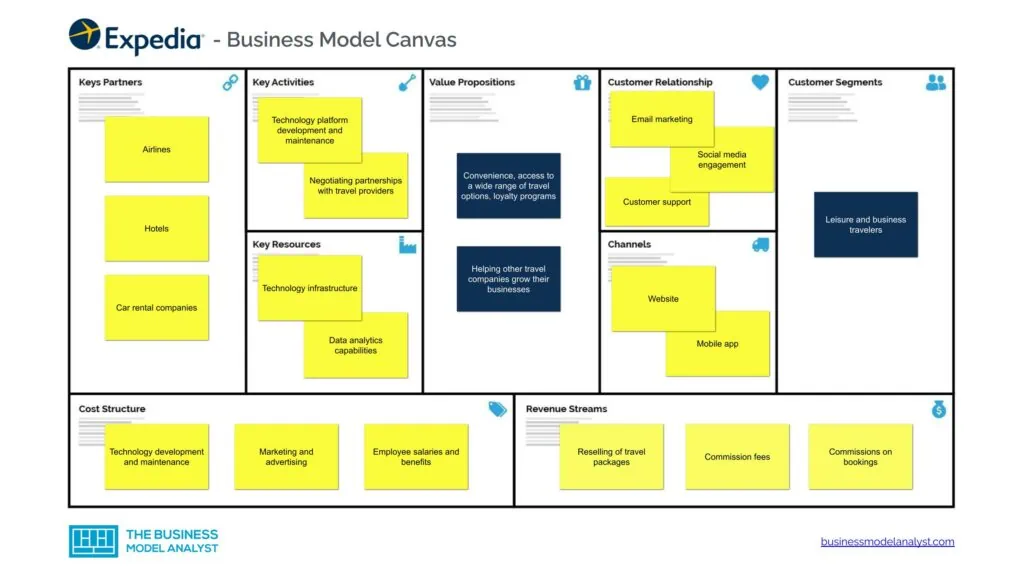
Expedia Customer Segments
Expedia customer segments consist of:
- Leisure and business travelers
Expedia Value Propositions
Expedia value propositions consist of:
- Convenience, access to a wide range of travel options, loyalty programs
- Helping other travel companies grow their businesses
- Increased customer traffic and revenue
Expedia Channels
Expedia channels consist of:
- Website
- Mobile app
- Partnerships with other travel companies
- Search engine optimization
- Online advertising
Expedia Customer Relationships
Expedia customer relationships consist of:
- Email marketing
- Social media engagement
- Customer support
- User-generated content and reviews
Expedia Revenue Streams
Expedia revenue streams consist of:
- Reselling of travel packages
- Commission fees
- Commissions on bookings
- Advertising
Expedia Key Resources
Expedia key resources consist of:
- Technology infrastructure
- Data analytics capabilities
- Partnerships with travel providers
- Brand reputation and customer base
Expedia Key Activities
Expedia key activities consist of:
- Technology platform development and maintenance
- Negotiating partnerships with travel providers
- Optimizing pricing and inventory management
- Customer acquisition and retention strategies
Expedia Key Partners
Expedia key partners consist of:
- Airlines
- Hotels
- Car rental companies
- Other travel providers
- Online travel agencies and metasearch engines
Expedia Cost Structure
Expedia cost structure consists of:
- Technology development and maintenance
- Marketing and advertising
- Employee salaries and benefits
- Partnerships with travel providers
- Customer support and payment processing
Expedia Competitors
Expedia operates in a highly competitive industry, with many other online travel agencies (OTAs) vying for market share. Some of the major players in this space include Airbnb, Booking.com, CheapTickets, Ebookers, Wotif Group, and Classic Vacations.
- Booking.com: It is one of the biggest competitors of Expedia. Both companies have a similar business model, but Booking.com primarily focuses on agency bookings, while Expedia relies heavily on merchant bookings. However, Booking.com’s parent company generates more revenue than Expedia alone;
- Airbnb: It is another major competitor of Expedia. While Airbnb is primarily known for its home-sharing platform, the company has recently expanded into the travel booking space. Airbnb’s unique selling point is its ability to offer travelers a more authentic and local experience by allowing them to stay in homes and apartments rather than traditional hotels;
- CheapTickets and Ebookers: These are two other OTAs that compete with Expedia. Both companies offer similar services, including flight and hotel bookings, car rentals, and vacation packages. However, CheapTickets and Ebookers are smaller players in the market compared to Expedia and Booking.com;
- Wotif Group: It is an Australian-based OTA that was acquired by Expedia in 2014. While Wotif Group still operates as a separate brand, it competes directly with Expedia in the Australian and New Zealand markets;
- Classic Vacations: It is a luxury travel company that offers personalized vacation packages to high-end clients. While Classic Vacations is not a direct competitor of Expedia, the company’s focus on luxury travel could potentially impact Expedia’s market share in the high-end travel space.
Expedia SWOT Analysis
A SWOT analysis of Expedia’s business model provides insights into the company’s strengths, weaknesses, opportunities, and threats.
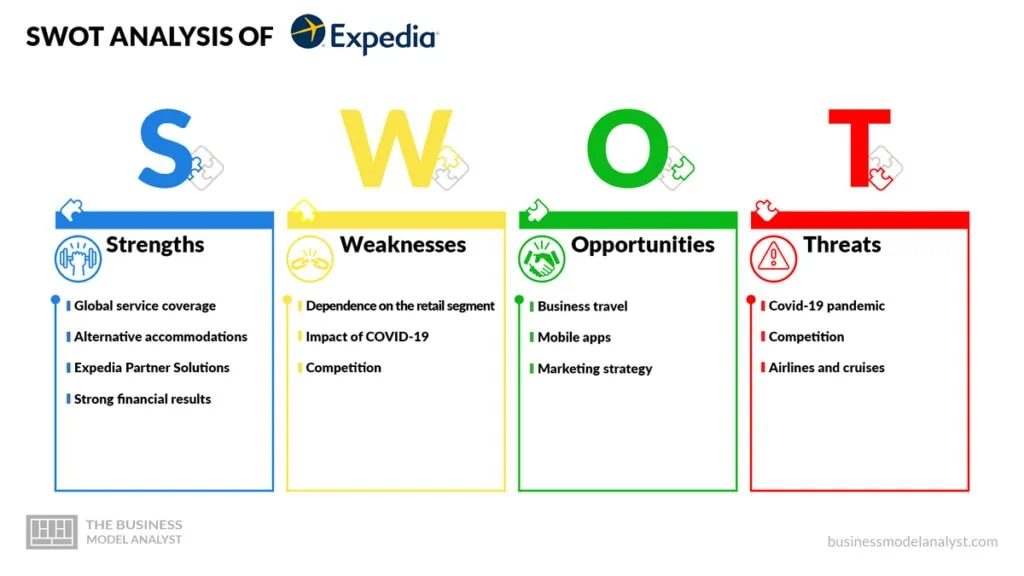
Expedia Strengths
- Global service coverage: Expedia’s diverse brand portfolio, including hotels.com, Vrbo, Orbitz, and Travelocity, provides global service coverage to customers;
- Alternative accommodations: Expedia’s acquisition of HomeAway and Vrbo has enabled the company to offer alternative accommodations to customers, including vacation rentals and apartments;
- Expedia Partner Solutions: The company’s Expedia Partner Solutions offers a range of services to travel businesses, including a search aggregator, advertising model, and merchant model;
- Strong financial results: Expedia’s financial results have been strong, with net income of $566 million in 2022.
Expedia Weaknesses
- Dependence on the retail segment: Expedia’s business model heavily depends on its retail segment, which includes hotel bookings and airfare reservations;
- Impact of COVID-19: The COVID-19 pandemic has had a significant impact on the travel industry, and Expedia’s business has been affected as a result;
- Competition: Expedia faces stiff competition from other online travel platforms, including Trivago and Booking.com.
Expedia Opportunities
- Business travel: As the world recovers from the COVID-19 pandemic, there may be opportunities for Expedia to expand its business travel offerings;
- Mobile apps: Expedia can leverage mobile apps to increase customer engagement and improve the travel booking experience;
- Marketing strategy: Expedia can develop a robust marketing strategy that leverages social media and search engine marketing to attract and retain customers.
Expedia Threats
- Covid-19 pandemic: The ongoing COVID-19 pandemic continues to be a significant threat to Expedia’s business model;
- Competition: Expedia faces intense competition from other online travel platforms, including Booking.com and Airbnb;
- Airlines and cruises: Airlines and cruise companies may develop their own travel booking platforms, which could threaten Expedia’s business model.
Conclusion
Expedia has been a pioneer in the online travel industry since its inception over 25 years ago. Its business model of offering a comprehensive travel platform where travelers can search for flights, hotels, and other travel reservations has been a key driver of its success. By aggregating travel options in one place, the company encourages many travelers to use their site to quickly and conveniently book travel.
Expedia’s proprietary technology platform is its key resource, enabling seamless online booking and reservation management. The company’s focus on technology has allowed it to continuously improve its user experience and offer innovative products and services. Expedia’s recent updates to its app and websites to focus more on working with consumers on their trips, rather than just focusing on the volume of bookings, demonstrate its commitment to providing a personalized travel experience.
While Expedia faces competition from other online travel agencies and travel search engines, its strong brand recognition, extensive inventory of travel options, and focus on technology give it a competitive edge. Expedia’s ability to adapt to changing consumer preferences and travel trends will be critical to its continued success in the years to come.

